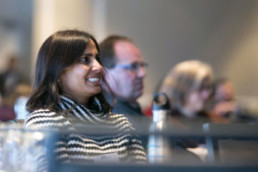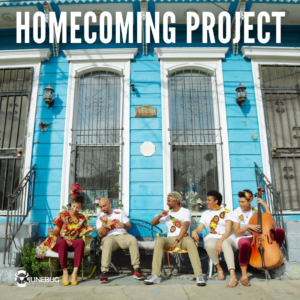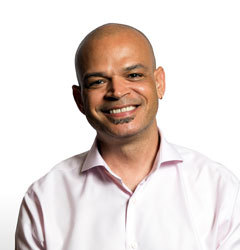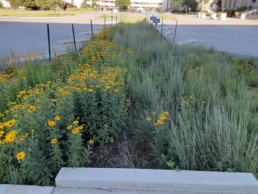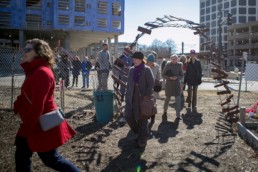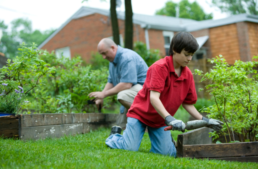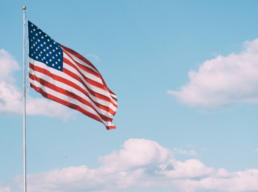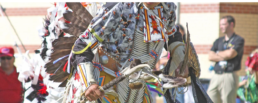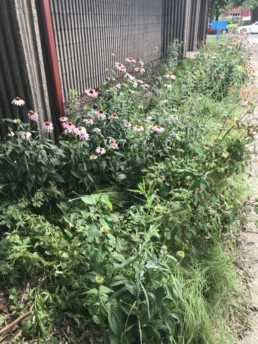Who's speaking at #TFN2021? Read about our plenary speakers and other highlights
BY TFN STAFF
We're thrilled to share new updates to our lineup of speakers and sessions for The Funders Network's 2021 Virtual Conference: Rise Together. TFN's virtual conference will bring compelling and inspiring plenary sessions that will explore how BIPOC women are harnessing political power in the South, celebrate the art of Black storytelling, and delve into the urgent need to build a multiracial movement for racial justice.
Opening Plenary
Women of Color — Building Power and Revitalizing Democracy
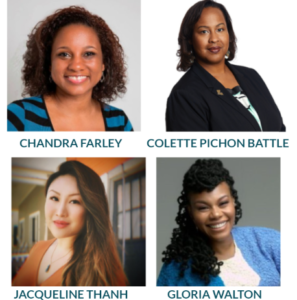
Monday, March 15 | 12:30 to 1:15 p.m. ET
The radical visions and practical solutions arising from communities facing relentless racial terror, compounding health and climate crises, and historic disinvestment offered key lessons to funders during 2020. Whether we begin with the undeniable urgency of COVID-19, police brutality, or economic and ecosystem collapse, we see the culture-led strategies from the South as potent examples of movement innovation across all challenges.
This session shares the visions and lessons of leaders deeply connected to intergenerational and intersectional movements across the South who know what’s possible for economic development, housing, climate resiliency, energy/food/water ecosystems, and our culture. This conversation is an invitation to show up in ways that transform scarcity into abundance, not only in the resources moved or practices held in philanthropy, but more broadly in our very culture of leadership.
Speakers:
Colette Pichon Battle, Executive Director, Gulf Coast Center for Law and Policy
Chandra Farley, Just Energy Director, Partnership for Southern Equity
Jacqueline Thanh, Executive Director, VAYLA New Orleans
Gloria Walton, CEO, The Solutions Project
Homecoming Project: Lift Every Voice
Monday, March 15 | 4 p.m. ET
TFN is honored to welcome New Orleans-based Junebug Productions' Homecoming Project to share their work at our 2021 virtual conference.
The Homecoming Project is a community-based, storytelling performance series that aims to marry high-quality artistic practice with a commitment to maintaining the essential relationship between culture and progressive social change through engagement with New Orleans communities that have been historically oppressed and exploited.
Junebug is the organizational successor to the Free Southern Theater, founded in 1963, whose objective was to stimulate creative and reflective thought among African Americans in the rural South by bringing the theater to the people. The Homecoming Project honors that vision with performances that activate public spaces in the neighborhoods they are meant to reflect, making sure that they are accessible to all.
Closing Plenary: Glenn Harris
President, Race Forward & Publisher, Colorlines
Wednesday, March 17 | 4:15 p.m. ET
We are excited to have Glenn Harris, president of Race Forward and publisher of news site Colorlines, with us as our 2021 closing plenary speaker.
Race Forward catalyzes movement building for racial justice. In partnership with communities, organizations, and others, they build strategies to advance racial justice in our policies, institutions, and culture.
Race Forward united with the Center for Social Inclusion (CSI) in 2017 — in part to address an urgent need to build a multiracial movement for racial justice, and out of recognition that the two racial justice organizations were stronger together.
The new Race Forward is home to the Government Alliance on Race and Equity (GARE), a national network of government working to achieve racial equity and advance opportunities for all, which Harris helped found. Race Forward also publishes the daily news site Colorlines and produces Momentum: A Race Forward Podcast featuring stories and strategies for racial justice.
Harris has more than 25 years of experience working on issues of race and social justice, including as president of Center for Social Inclusion from 2014 until its union with Race Forward. Prior to the new Race Forward and CSI, Harris served as manager of Seattle's Race and Social Justice Initiative (RSJI), whose mission is to end institutionalized racism in city government.
Also on the Agenda...
TFN’s 2021 Virtual Conference: Rise Together will create a virtual space for funders to explore the strategies and stories that are creating more equitable, sustainable, and resilient places to live — work that has taken on increased urgency as we face the dual challenges of a global pandemic and structural racism.
We’ve designed sessions that are intersectional, cross-cutting and grounded in racial equity and speak to activism, collaboration and movement building. Please take a look at our Conference Agenda for the latest on our lineup of sessions and speakers.
New this year
Critical Conversations
In this time of social distancing, it’s important for us to connect with compassion, humanity and understanding. TFN’s conference will offer Critical Conversations, an opportunity to have frank, open, peer-facilitated exchanges of ideas and experiences, and perhaps learn a little bit about each other in the process. Some themes we'll explore: Covid & Racism; Being Black in Philanthropy; Decolonizing Leadership and Healing & Trauma. Please take a look at our Conference Agenda for times and facilitators.
Shop Local...From Afar
Our Shop Here! Virtual Market offers conference participants the opportunity to order directly from NOLA-based vendors, artisans, and social enterprises as a way to support these local vendors and minimize the economic impact of our inability to convene in New Orleans because of the COVID-19 pandemic. (Launching soon, please stay tuned!)
More to Come!
Please be sure to check out our conference webpage for more information on registration, events, and updates on speakers and sessions. (And be sure to follow us on Twitter @funders_network for more #TFN2021 news.)
New grant opportunities! Partners for Places launches new round to support sustainability projects in U.S. and Canada
BY TFN STAFF
The Funders Network (TFN), in partnership with the Urban Sustainability Directors Network (USDN), is pleased to announce the opening of the latest round of the Partners for Places grant program.
The deadline to submit proposals is March 19.
Partners for Places is a successful matching grant program that improves communities by supporting equitable sustainability projects that build partnerships between local government leaders, community groups and place-based foundations in the U.S. and Canada.
National funders invest in local projects developed through these partnerships to promote a healthy environment, a strong economy and well-being for all residents.
Through these investments, Partners for Places fosters long-term relationships that make our communities more resilient, prosperous and equitable.
These one-to-one matching awards provide partnership investments between $25,000 and $75,000 for one-year projects, or between $75,000 and $150,000 for two-year projects, with a 1:1 match required by one or more local foundations.
Interested in applying?
Download the Round 18 Invitation to Apply and the Round 18 Application and Award Guidance Document.
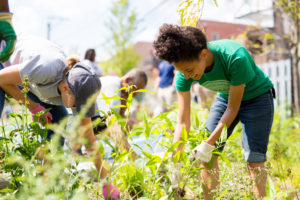
Strategic Direction
Collaboration and partnership are at the heart of the Partners for Places program.
Since 2012, the matching grant program has helped foster dozens of new partnerships between local government sustainability leaders and place-based funders across the U.S. and Canada — relationships that often continue long after the original Partners for Places project has been completed.
In recent years, the grant program has adopted a strategy that leads with racial equity and a sharper focus on how best to advance equitable and sustainable communities.
Starting with the Round 17 Invitation to Apply released in July of 2020, the primary partners have been expanded to include local frontline community-led groups.
This collaborative partnership model is intended to more deeply embed the values and practice of racial equity into local community decision-making processes. Read about the Round 17 grantees here.
About Partners for Places
Partners for Places is led by TFN in partnership with the USDN. As in previous grant cycles, we are excited to partner with Green Infrastructure Leadership Exchange, a practitioner network that supports communities seeking to grow green stormwater infrastructure (GSI) programs, to support outreach efforts.
To date, Partners for Places has awarded nearly $8.2 million across North America in this successful matching grant program, leading to over $17 million in investments.
The program is currently supported by five investor foundations: The JPB Foundation, The Kendeda Fund, The Kresge Foundation, The New York Community Trust, and Pisces Foundation.
Submitting a Successful Proposal
Partners for Places currently administers two grant programs: General Grants, and a Mini Grants program.
General Grants in Round 18 will:
1. Create or improve collaborative partnerships between a local government sustainability and/or water department(s), frontline community-led group(s), and place-based funder(s).
2. Advance an equitable sustainable climate action and/or GSI project that addresses frontline community priorities.
3. Apply a racial equity approach to both the collaboration and the project planning/implementation.
The application deadline for Round 18 is March 19, 2021 (by 11:59 p.m., any time zone).
Please visit the Partners for Places webpage for more information. Here you can view our promotional video, download the Round 18 Invitation to Apply, which includes the Grant Application and Budget form. You may also consult the Round 18 Application and Award Guidance Document.
Additional Resources
Register for our Round 18 Informational Webinar designed to help potential applicants prepare a proposal on Feb.16 at 4 p.m. ET. Register here.
Read this feature story about Partners for Places in Inside Philanthropy here.
For more information about the Partners for Places program, please feel free to reach out to Ashley Quintana at ashley@fundersnetwork.org.

Apply Today! TFN's Systems Transformation Learning Series
BY TFN STAFF
Note: This post has been updated to reflect the extended period for Early Bird applications.
The Funders Network is excited to announce our new Systems Transformation Learning Series, which will help funders gain the frameworks, methods and tools to catalyze and support systemic change.
As we continue to see the ongoing harm caused by growing economic inequity, ongoing structural racism, deepening political polarization and a worsening climate crisis, we are committed to helping the sector find concrete and actionable ways to work together in support of the communities we serve.
TFN believes that systems thinking frameworks and collaborative network practices are a powerful combination for addressing the complex, interconnected and systemic problems we face.
Supported by the Garfield Foundation, this five-part learning series will offer deep dives into the key concepts and capacities that will allow grantmakers to be true changemakers —identifying strategic actions and pathways that will accelerate lasting solutions.
The series is open to all funders, and will bring together grantmakers from diverse backgrounds and program portfolios.
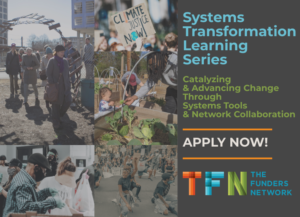
How to Apply
The deadline to apply for TFN’s Systems Transformation Learning Series is midnight Feb. 25, 2021.
You can complete our online application form here.
Candidates that apply before midnight Feb. 17 and are ultimately accepted will receive a discounted Early Bird rate.
Applicants will be notified by March 12 if they have been accepted.
Registration Fees
Early Bird Rate
For accepted participants who submitted applications before midnight Feb. 17.
• TFN Members: $1,350 per person
• Non-members: $1,550 per person
Regular Rates
For accepted participants who apply on or after Feb. 18.
• TFN Members: $1,650 per person
• Non-members: $1,850 per person
About this Series
• This Learning Series cohort is limited to 30 participants.
• The series will consist of five virtual sessions, each four-hours long, with applied exercises between sessions.
• Sessions will take place from 1 to 5 p.m. ET on these dates:
April 7
May 26
June 30
July 14
July 28
Scholarships
We recognize that many organizations are facing challenges during these uncertain times. We have a limited number of scholarships to help offset the cost this learning series. If cost is a barrier to participating in this event, please reach out to TFN Director of Programs Ann Fowler Wallace at ann@fundersnetwork.org.
Who Should Join our Systems Transformation Learning Series?
• Do you want clearer sense of how to show up as a funder in systemic collaborations?
We’ll explore how to optimally engage as a funder in a network/multi-stakeholder collaborative; roles that are more and less appropriate for funders; how to mitigate negative impacts from power differences; and the power of transparency, self-disclosure, and vulnerability.
• Are you seeking a better understanding of the essential conditions for effective systemic collaboration? We’ll learn about core factors that have contributed to the success of systemic collaborations among funders and between funders and NGOs, why these factors are important, and some ways to evaluate process and impact outcomes in systems change work.
• Are you searching for insight on how to collaborate effectively with other funders? This learning series includes how to get other funders to co-invest and address perceived turf conflicts, the desire for “unique” success, and each funder’s commitment to its own theory of change.
• Are you trying to navigate the interests of trustees, donors and stakeholders? We will share strategies for aligning trustee and donor interests and priorities with those of system stakeholders and to do productive work with their interests, values, and ‘resistance’ to change.
• Are you in open to new funding ideas, approaches and models? This series will share ways to support systemic collaborations that don’t rely entirely on your organization’s funding.
• Would you like to enhance your ability to see and work effectively with a number of creative tensions or polarities that always show up in funding systems change? Join us as we find ways to effectively balance:
– Funder needs/priorities and grantee needs/priorities
– Collective intent/vision and differentiated situations/needs
– Short-term wins and Long-term strategies
– Learning and action
– Individual change & Institutional change
– Diagnostic approaches & Dialogic approaches
Trainers and Facillitators
TFN’s Systems Transformation Series will be led by Russ Gaskin and Luzette Jaimes of CoCreative, which specializes in developing multi-stakeholder “innovation networks” to solve complex problems like revitalizing economically distressed communities, closing racial equity gaps along multiple dimensions, growing employee ownership, building regenerative food supply chains, and eliminating harsh toxins from electronics manufacturing facilities. To learn more about the CoCreative team and their work, please visit wearecocreative.com.
If you have any questions about TFN’s Systems Transformation Learning Series, feel free to reach out to Director of Programs Ann Fowler Wallace at ann@fundersnetwork.org.
Small Cities Can Lead on Clean Energy, Too
BY American Council for an Energy-Efficient Economy (Cross post)
This post was originally shared on the American Council for an Energy-Efficient Economy (ACEEE) website, announcing the results of a 30-city analysis of how smaller municipalities are approaching and incorporating clean energy. The Community Energy Challenge is sponsored by ACEEE, the Sustainable States Network, Sustainable CT, Green Cities California, Sustainable Maryland, Minnesota GreenStep Cities, and Sustainable Jersey. (The work and participating organizations are supported by several TFN members, including the Emily Hall Tremaine Foundation and the Geraldine R. Dodge Foundation.) For the full ACEEE announcement, visit their website here.
An recent analysis by of clean energy efforts by 30 small cities finds several leaders taking significant steps to cut energy waste and embrace clean energy—pointing the way for other small municipalities across the country to do the same. The American Council for an Energy-Efficient Economy (ACEEE) examined the cities’ efforts to make homes and buildings more energy efficient, to scale up the use of renewable energy, and to ensure community involvement in developing equitable clean-energy policies. The cities analyzed, with populations generally between 16,000 and 100,000, are in California, Connecticut, Maryland, Minnesota, and New Jersey.
San Luis Obispo (California) received the top score of the group, earning points for its policy incentivizing all-electric equipment and appliances in new buildings and for participating in a program that offers carbon-free electricity to residents. Second place went to Goleta (California), followed by St. Louis Park (Minnesota), Manhattan Beach (California), West Hollywood (California), West Hartford (Connecticut), Rockville (Maryland), Dublin (California) and Red Wing (Minnesota) (tied), and Rochester (Minnesota).
ACEEE evaluated each of the communities on policy metrics assessing government operations, community initiatives, buildings policies, and energy and water utilities. The combined scores allowed ACEEE to rank the municipalities. The analysis assessed policies and programs to make energy efficiency upgrades in homes and businesses, accelerate the adoption of renewable energy, set long-term commitments to reduce greenhouse gas emissions, and establish and enforce building codes.
ACEEE scored the cities’ energy efficiency and renewable energy strategies using the metrics from its annual City Clean Energy Scorecard, employing a modified version of its Local Clean Energy Self-Scoring Tool, Version 4.0 released in 2019. The leading small cities outperformed a significant portion of the larger cities scored each year (excepting transportation policies, which were not evaluated for the small cities).
The 30 cities volunteered to be evaluated as part of the Community Energy Challenge sponsored by ACEEE, the Sustainable States Network, Sustainable CT, Green Cities California, Sustainable Maryland, Minnesota GreenStep Cities, and Sustainable Jersey. Moving forward, ACEEE and the Great Plains Institute will provide the cities with technical assistance to support their energy efficiency and renewable energy efforts.
While each participating city is taking steps to reduce greenhouse gas emissions, the highest scorers led the way by setting goals to reduce energy use and greenhouse emissions, adopting green building requirements, and pressing for decarbonization of the electric grid. Even these leaders have significant room to grow, earning roughly half of the available scoring points.
“We found that even quite small cities and towns can take meaningful action to cut energy waste and reduce carbon emissions,” said David Ribeiro, director of local policy at ACEEE. “A number of critical tools to fight climate change—and to do so in an equitable way—are things that have to be set locally. From the largest cities to the smallest ones, they’re all going to need to step up further. We hope some of these leading cities can help show the way for their peers.”
To view the scores and ranks of cities participating in the Community Energy Challenge, visit the ACEEE page here.
Planning for Greening Community Development Stimulus Funding | Webinar Jan. 28
Please join funder and community development colleagues for a webinar that will explore how the $12 billion Neighborhood Capital Investment program created through the last stimulus can be leveraged by community development financing institutions, green banks, and foundations to help advance local sustainability and climate goals.
The Jan. 28 webinar, Planning for Greening Community Development Stimulus Funding, is co-sponsored by TFN as well as the Climate and Energy Funders Group, Coalition for Green Capital, Environmental Grantmakers Association, The William and Flora Hewlett Foundation, Inclusiv, and the New York Community Trust.
Amir Kirkwood from the Opportunity Finance Network (OFN) will present on overview of this program, which focuses explicitly on low-income communities and communities of color. This presentation will be followed by a panel discussion of how these significant federal resources could help communities across the nation weather the continuing pandemic and finance a green recovery in its aftermath.
Moderator
Arturo Garcia-Costas, The New York Community Trust
Speakers
Marilyn Waite, William and Flora Hewlett Foundation
Amir Kirkwood, The Opportunity Finance Network
Frank Altman, Community Reinvestment Fund, USA
Duanne Andrade, Florida Solar & Energy Loan Fund
The panel discussion will be followed by Q&A. RSVP here to reserve your spot. Please note that this webinar is also open to non-funder partners of the Coalition for Green Capital and Inclusiv networks.

'Repair our Tattered Social Fabric and Help our Democracy Live up to its Ideals'
BY TFN STAFF
Like all of you, we at The Funders Network are horrified, saddened and angered by the disgraceful assault on democracy that unfolded in Washington D.C. this week.
We join with our peers in the philanthropic sector in speaking out against falsehoods, political violence and unequal justice.
TFN is proud to sign on to the below letter, circulated by the Democracy Funders Network and originally published on Medium, which condemns the violent insurrection at the U.S. Capitol Building and calls for accountability.
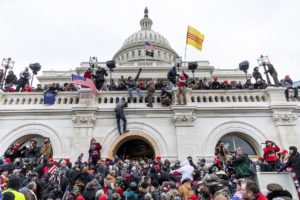
Philanthropies Condemn Political Violence, Call on Leaders to Protect Democracy and Get Back to the People’s Business |
|
As representatives of nonpartisan philanthropic institutions, serving rural, urban, and suburban communities across the nation, we condemn the violence that broke out at the U.S. Capitol this week. The events in Washington are a stain on our nation’s history and a painful break in the peaceful transition of power that has been a defining hallmark of American democracy for more than 200 years. The shameful events are the result of actions by President Trump and other political leaders who have recklessly fanned the flames of grievance. Those responsible for this deadly violence and insurrection must be held to account, and we call on Republican leaders, in particular, in government and media to unequivocally reject conspiracy theories and the actions of extremists who use violence. After hard-fought campaigns, extraordinary voter turnout, and the resolution of more than 60 election-related lawsuits, it is long past time for our nation to accept the results of the 2020 election so that our duly elected leaders — President-elect Biden, Vice President-elect Harris and members of the 117th Congress — can move forward with addressing the nation’s pressing challenges. Our organizations donate hundreds of millions of dollars to charitable causes each year to advance the common good. While we have different funding approaches, vary in our areas of focus, and are ideologically diverse, we share a belief in the importance of finding common ground to solve problems and serve people and communities. And while we may vary in our views on the size and scope of government, we share a belief that safeguarding the health, security, and rights of people and communities requires a government whose leaders can accept the election results, bridge divisions that have roiled our nation, work in good faith to forge solutions, and stand up for democracy. As the U.S. faces the most dire global health emergency in 100 years, the worst economic crisis in modern history, and a racial reckoning overdue for centuries, it is time to move on from last year’s election, cease further delays in the transition of power, and turn to governance. To our duly elected leaders, we urge you to follow facts and let science lead the way toward solving the COVID-19 crisis. We encourage you to listen to diverse voices — including those of people who have been overlooked, forgotten, and excluded, and who are facing persistent threats to their lives and livelihoods. We call on you to repair our tattered social fabric and help our democracy live up to its ideals. And we stand ready to work with you to move our country forward and increase opportunity for all who call it home. Visit the Medium post for contact information to add your organization's name to the letter, and to read the full list of signatories, which include many TFN members and partners. To read more reactions from the philanthropic sector, including statements from several TFN members and partners, read this round-up from the Chronicle of Philanthropy. |
Join us for Strengthening the Circle: Indigenous Approaches to Holistic, Inclusive Economies
BY TFN STAFF
North American Indigenous communities are calling upon deep connections to history, place and culture to develop distinctive forms of economic revitalization and community wealth-building.
We invite you to join our next learning network webinar, Strengthening the Circle: Indigenous Approaches to Holistic & Inclusive Economies at 2 p.m. ET Jan. 20, to learn how native leaders and community members are integrating traditional tools of community development with culturally specific strategies for long-term investment and sustainable impact.
The Amskapi Piikani (Blackfeet Nation), a tribe whose territory historically spanned from Montana into Canada along the Rocky Mountains, but whose reservation now only covers 1.5 million acres in northwestern Montana, are using food and natural resource management to drive economic renewal.
Through Blackfeet ways of knowing, being and planning, Blackfeet Nation members have developed an Agricultural Resource Management Plan that incorporates language and cultural revitalization, buffalo restoration, local healthy food sources, a new tribal protected area and a multi-species meat processing facility.
At the Northern Cheyenne Reservation, which lies on 444,000 acres in southeastern Montana, People’s Partners for Community Development is tapping tribal connections to support entrepreneurship and self-sufficiency to create long-term financial strength that can echo forward for generations. Since incorporating as the Community Development Finance Institution, the organization has originated more than 500 loans totaling in excess of half a million dollars to help tribal members launch small businesses on the reservation.
On the Crow Indian Reservation in south central Montana, Plenty Doors Community Development Corporation works to strengthen their community through business, entrepreneurship, and community development. They are devoted to creating thriving communities through a strong diverse economy while preserving the unique cultural and environmental qualities of our community.
Participants will come away from the webinar with an appreciation of the power of culturally-based revitalization and its application to communities across a range of settings.
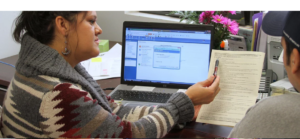
Strengthening the Circle: Indigenous Approaches to Holistic, Inclusive Economies
Jan. 20 at 2 p.m. ET
*Register here.*
Speakers:
Loren BirdRattler, Project Manager, Blackfeet Agriculture Resource Management Plan
Charlene Johnson, Executive Director, Plenty Doors CDC
Sharon Small, Executive Director, People’s Partner for Community Development
Moderator:
Bonnie Sachatello-Sawyer, Executive Director, Hopa Mountain
Meet the New Partners for Places Grantees! Nine communities, more than $1.3 million in sustainability funding
BY TFN STAFF
Combatting food insecurity by helping people plant home gardens in low-income neighborhoods. Working to help landscape workers embrace practices that protect their health and improve local ecosystems. Creating spaces that encourage community engagement and a sense of connection to the places where we live, work and play.
These community-based approaches that address climate impacts, strengthen local economies and improve the well-being of all residents are the latest round of projects that will receive funding thanks to the Partners for Places matching grant program.
Nine cities in the U.S. will receive more than $1.3 million to support these sustainability efforts — which focus largely on empowering and engaging low-income neighborhoods, embedding racial equity into local decision-making and building partnerships between government sustainability offices, place-based foundations and community-led frontline groups.
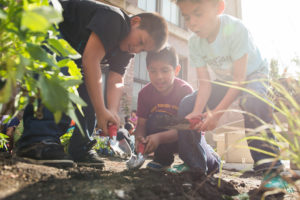
Engaging Communities, Building Partnerships
In Louisville, Ky., the grants will fund the construction of a sustainable, community-driven green space on what is currently a vacant parking lot adjacent to a community garden in the heart of the Parkland neighborhood — a historically Black community that has suffered economic disinvestment over the decades and which currently has no public parks — transforming the asphalt expanse into a welcoming and well-shaded cultural plaza with a playground and space for outdoor performances, retail vendors and open-air seating.
In Charlottesville, Va., the funds will go toward planning for deep energy efficiency through Passive House certification for over 100 new residential homes in the low-income housing community of Friendship Court. Deep energy efficiency will be coupled with rooftop solar panels, providing both direct and indirect long-term benefits to community members.
In Princeton, N.J., landscaping and horticultural service workers are at risk of injury from a wide variety of potential hazards in this industry, including exposure to chemicals, noise, machinery, lifting, construction, and weather-related hazards — practices that can also have a negative impact on the local ecosystem. Partners for Places will help fund a project that brings together Hispanic/Latinx rights organizations, environmental sustainability advocates, academic experts, and municipal departments and commissions to raise awareness, integrate day laborer concerns into policy decisions, and educate landscapers and residents to make progress on these issues.
In Miami-Dade County, Fla., where steep economic and racial disparities make access to healthy, affordable food difficult in many neighborhoods, Partners for Places will help community groups build on their efforts to combat food insecurity. This includes educating low-income residents on effective gardening practices through the enhancement of two local community garden spaces that will host free workshops where free fruit trees, vegetable plants and medicinal herbs will be made available to attendees. Additionally, the project will install home gardens for residents in low-income frontline communities in North Miami, Little Haiti, Liberty City, and Overtown, home to a large percentage of Black residents and immigrants from Latin America and the Caribbean.
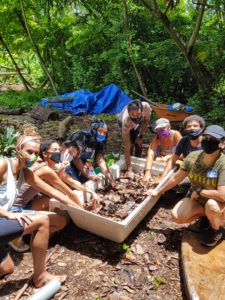
Fostering authentic and inclusive community engagement, especially in areas that have been racially and economically marginalized, is an essential goal of many Partners for Places projects. In Multnomah County, Ore., home to the City of Portland, the grants will be used to create a “third space” — meaning a place for togetherness separate from work or living spaces — for community-based organizations, community members, government and local funders to come together with the intent to co-create intersectional and innovative solutions that advance climate justice.
In Lancaster, Pa., the funding will ensure that the city’s comprehensive plan reflects community consensus about the direction for future growth and development for the next 20 years, including policies around zoning, housing, transportation, the environment, and other factors that impact quality of life.
And in New Orleans, La., Partners for Places will support efforts to advance racial equity in preparing the city for climate change by implementing recommended actions in the report Taking Steps Together on Equity & Climate Change: a Report by and for New Orleanians, released in 2019. (This report was produced through a previous New Orleans project funded by Partners for Places and the Greater New Orleans Foundation).
This round of Partners for Places funding also includes specific support for green stormwater infrastructure projects. The Funders Network and the Urban Sustainability Directors Network are excited to partner with Green Infrastructure Leadership Exchange, a practitioner network that offers a platform for communities to share experiences, circulate ideas, and solve problems together toward finding more sustainable water infrastructure solutions. Staff from this network support Partners for Places outreach efforts and participate in reviewing stormwater infrastructure project proposals.
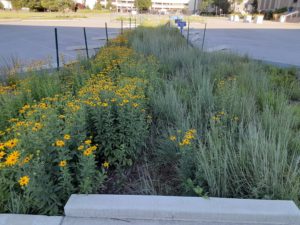
Green Stormwater Infrastructure Grants
Two cities have been selected for these Partners for Places green stormwater infrastructure grants:
Partners for Places will support an initiative in Chicago, Ill., known as Space to Grow, which builds green schoolyards at neighborhood schools located in the communities most vulnerable to urban flooding. The schoolyards provide healthy, engaging places for kids to play and exercise, and also feature areas for learning and exploration, such as outdoor classrooms, native trees and plants and vegetable gardens.
In Gary, Ind., the funds will help maintain green infrastructure through the creation of a shared services model in Northwest Indiana and Illinois’ Calumet region in order to reduce costs across multiple municipalities, including workforce training and partnering with municipalities that are majority Black and/or Latinx that are disproportionately affected by flooding in the region.
About Partners for Places
Partners for Places, led by The Funders Network (TFN) in partnership with the Urban Sustainability Directors Network (USDN), will provide $457,000 in funding to seven cities through the general grant program. This grant cycle also includes $125,000 awarded to the green stormwater infrastructure projects in Chicago and Gary, Ind.
With contributions from local matching funders, a total of $1,334,000 will be committed to fund sustainability projects in these selected cities.
To date, Partners for Places has awarded more than $8 million across North America in this successful matching grant program, leading to more than $17 million in investments.
Since 2012, the matching grant program has helped foster dozens of new partnerships between local government sustainability leaders and place-based funders across the U.S. and Canada — relationships that often continue long after the original Partners for Places project has been completed.
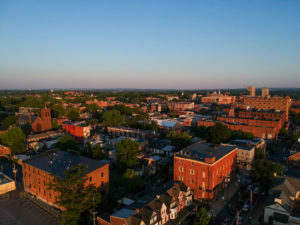
Leading with Racial Equity
In recent years, the grant program has adopted a strategy that leads with racial equity and a sharper focus on how best to advance equitable and sustainable communities.
Starting with this round of general grants announced today, the primary partners have been expanded to also include local frontline community-led groups. These groups consist of any nonprofit organization or group of nonprofit organizations that are made up of or serve people who are impacted by systems of oppression and injustice, economic disadvantage, and environmental harm.
This collaborative partnership model is intended to more deeply embed the values and practice of racial equity into local community decision-making processes.
The matching grant program brings national funder investors together with place-based funders to support local sustainability and climate action projects. The program is supported by five investor foundations: The JPB Foundation, The Kendeda Fund, The Kresge Foundation, The New York Community Trust, and the Pisces Foundation.
Partners for Places will open a new round of funding for the general grant program in early 2021.
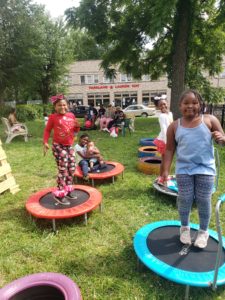
The latest Partners for Places general grant recipients and their matching funders are:
- Charlotesville, Va. ($150,000): To provide long-term benefits to the residents of Friendship Court, a low-income housing community, by deploying full rooftop solar panels on new residential buildings that implement energy efficient “passive house” design principles. Frontline community-led group: Piedmont Housing Alliance. Matching funder: Anonymous at the request of the funder ($300,000).
- Lancaster, Penn. ($75,000): To help create a comprehensive plan that is inclusive and equitable by ensuring its core values, priorities, and policies are informed by robust community engagement. Frontline community-led group: Lancaster Equity Community Development Corporation. Matching funder: High Foundation ($75,000).
- Louisville, Ky. ($42,000): To bring partners and community members together to realize a long-held vision of a green, active and engaging civic space that will support efforts to restore the Parkland neighborhood’s once-thriving center. Frontline community-led groups: Louisville Community Design Center DBA Center for Neighborhoods, and Parkland Business and Development Association. Matching funder: Community Foundation of Louisville ($42,000).
- Miami-Dade County, Fla. ($25,000): To combat food insecurity and promote environmental equity by educating residents on effective gardening practices through workshops and installation of home gardens in four low-income communities. Frontline community-led groups: Green Haven Project, Grow Roots Miami, Plant Philosophy, Neat Streets Miami, and Urban Oasis Project. Matching funder: The Miami Foundation ($25,000).
- Multnomah County, Ore. ($75,000): To establish a “third space” — a social space distinct from home or workplace — for frontline communities and local government to come together to co-create intersectional solutions that advance climate justice. Frontline community-led group: Coalition of Communities of Color. Matching funder: Meyer Memorial Trust ($75,000).
- New Orleans, La. ($60,000): To implement recommendations from Taking Steps Together on Equity and Climate Change: A Report by and for New Orleans selected by frontline leaders and advocates, and integrate those report recommendations into the city’s updated Climate Action Plan. Frontline community-led group: Deep South Center for Environmental Justice. Matching funder: Greater New Orleans Foundation ($60,000).
- Princeton, N.J, ($30,000): To improve the health and safety of landscape workers and address suburban landscaping practices that negatively impact the local ecosystem by bringing together Hispanic/Latinx rights organizations, environmental sustainability advocates, academic experts and municipal departments and commissions to raise awareness, integrate day laborers’ concerns into policy decisions, and educate landscapers and residents to make progress on these issues. Frontline community-led group: Latin American Legal Defense and Education Fund, Sustainable Princeton, and Unidad Latina en Acción NJ. Matching funders: Fox Foundation, and Leen Foundation ($25,000).
The latest Partners for Places recipients for green stormwater infrastructure projects and their matching funders are:
- Chicago, Ill. ($100,000): To use green stormwater infrastructure to improve Chicago’s climate resilience by transforming Chicago schoolyards into vibrant green spaces for play and learning. Matching funder: Hamill Family Foundation ($100,000).
- Gary, Ind. ($25,000): To develop a practicable solution to successfully maintain green stormwater infrastructure by using shared services that capitalize on public-private partnerships, cross-sector and bi-state collaboration, workforce development and new job opportunities, which can be replicated throughout the region. Matching funder: The Legacy Foundation ($25,000).

Additional Resources
Partners for Places Grants Map & Idea Bank
The Funders Network recently launched a new interactive Partners for Places Grants Map as well as a robust reboot of the Partners for Places Idea Bank featuring a searchable database of completed projects.
Visit the Partners for Places homepage on the TFN website to view interactive Grants Maps for both U.S. and Canadian projects that have been supported by the matching grants program.
Each completed project on the map includes a link that will take you to that project's entry on the Partners for Places Idea Bank. (You can also access the Idea Bank directly via the pulldown menu at the top of the page, or via resource links embedded on the Partners for Places homepage.)
More than 100 completed Partners for Places projects are featured in the Idea Bank, including a description of the project, matching funders, lessons learned and additional resources.
Partners for Places Mini Grants
Partners for Places Mini Grants are designed to spark new relationships or deepen existing connections that will hopefully help these communities develop a successful Partners for Places project proposal in the future. Learn about the latest Mini Grants recipients here.
In the News
Partners for Places has been featured in Inside Philanthropy. Read the most recent story here.
Contact Us
For questions about the Partners for Places grants program, please reach out to Ashley Quintana.
Smart Growth California's Fall Learning Wrap-up
By Tim Mok, Kerry Hastings and Ron Milam, Smart Growth California
We're excited to share this cross post, which originally appeared on the Smart Growth California blog. To learn more about Smart Growth California, an initiative of The Funders Network, visit their website here.
Transit Justice is Racial and Climate Justice
On October 1st, 2020, the Los Angeles Funders’ Collaborative, a workgroup of Smart Growth California hosted a virtual conversation with transit justice leaders in Los Angeles. Below are some key highlights:
David Bragdon, Executive Director of Transit Center, who moderated the panel, noted that advancing racial and climate justice require us to also push for just transit systems that serve everyday riders. The intersection is inevitable.
Chanell Fletcher, Executive Director of ClimatePlan grounded the discussion by outlining California’s legacy problem of underfunding public transportation, while prioritizing roads and highways that have segregated and displaced communities. Highway and road infrastructure was designed with racial segregation in mind, and has left it’s mark today with black and brown communities breathing toxic air and bearing disproportionate health impacts. How can we respond? Inspired by Black Lives Matter and defunding the police, we can move towards defunding road projects and reallocating resources into public transportation. Better public transportation for riders including black and Latinx women, can better connect them to good jobs, and a path towards economic mobility. Increased transit ridership can also reduce CA’s carbon footprint, and help achieve the state’s aggressive climate goals.

Laura Raymond, Director of ACT-LA, attested that transit-dependent Angelenos, particularly bus riders, have been burdened by decades of disinvestment, and are cut off from economic opportunity. While Metro LA is stewarding $160 billion towards transit, most of that funding is towards rail projects despite 70% of transit riders taking the bus. LA has also seen an increase in policing by transit, “a practice rife with racist discrimination,” exclaimed Raymond.
Alexandra Suh, Executive Director of Koreatown Immigrant Workers Alliance and Carla De Paz, Project Director of Community Power Collective brought focus to the intersectionality that transit plays. Transit riders are also restaurant workers, low-income renters, and undocumented immigrants, but a transit policy win touches on every justice issue beyond the bus. Community power in Boyle Heights has held Metro accountable for the development of public land, which impacts street vendors, bus riders and how the community interacts with the environment. CPC secured affordable housing on eight Metro-owned lots, and is leading anti-gentrification initiatives.
LA is mobilizing, the #PeoplesTransit campaign, spearheaded by ACT-LA, KIWA, CPC and over a hundred other organizations are advancing racial, climate and transit justice now. Last June, a motion passed with Metro’s Board instructing a task force of community-based organizations to move money out of policing and towards community alternatives to safety. The campaign is drafting those alternatives now and simultaneously fighting bus service cuts. A Transit Oriented Communities Implementation Plan is going to Metro’s Board this month, centered on housing and anti-displacement policy along every rail and bus line.
Intersectional partnerships are critical to move towards a just transition, and improved outcomes for all people.
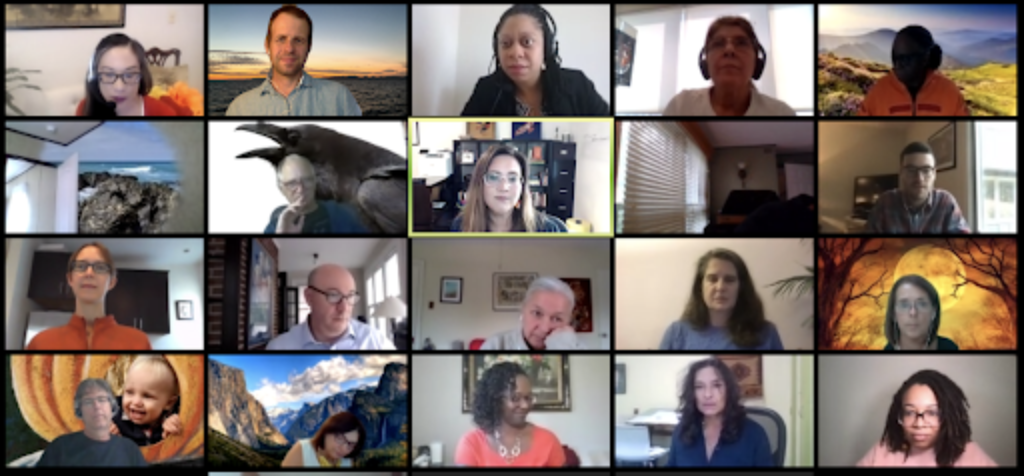 Leaning on Relationships & Trust to Advance Equity and Impact
Leaning on Relationships & Trust to Advance Equity and Impact
In the last several years, some in philanthropy have risen to the challenge of asking deeper questions around equity in their giving practices. Whether using a participatory grantmaking framework, trust-based philanthropy principles, or a deeper equity-analysis, many funders have embarked on a journey to have more equitable relationships with grantees and unravel some of the innate power dynamics at play.
On October 20th, funders gathered together to hear how two foundations – the Legler Benbough Foundation in San Diego and the Compton Foundation based out of the Bay Area – are implementing these practices, and what they are learning along the way. Each foundation puts relationships front and center, and works to lighten the burden on grantees through individualized check-ins as opposed to labor-intensive grant reports.
Legler Benbough, a spenddown place-based foundation, has built close relationships with partners and provides mentorship and guidance when needed, as well as flexibility with grant logistics based on the needs of each organization. Compton Foundation is a national funder and therefore cannot visit partners in person, but has check-in calls and works to trust that their partners’ movement-building and narrative work, while at times difficult to measure, is moving the needle on change.
Both foundations approach their relationship with grantees from a position of listening and trusting that folks on the ground know the issues and solutions that are best for their community, and that their role as funders is to equip them with various resources and then step back to let them lead. This session was hosted in partnership with the Environmental Grantmakers Association and facilitated by the Trust-Based Philanthropy Project. If you are interested in going deeper in the six trust-based philanthropy principles on a future call, contact kerry@fundersnetwork.org.
The Funders Network Learning Webinars
TFN, the national funder network that Smart Growth is a part of, also continues hosting their own monthly learning webinars. Two of these recent sessions lifted up issues relevant to funders in California. The first, How We Move: New Polling Data on Transportation, lifted up research relevant to the mobility fund, which just granted it’s first $700,000 to groups around the country, including California. Another convening, Haciendo el Cambio: How Latinx Communities are Harnessing Power and Building Alliances for Climate Justice, lifted up work taking place in California.
For a link to these webinar recordings, email Ron Milam. To learn about upcoming convenings hosted by Smart Growth California and The Funders’ Network, check out our events page. Also mark your calendar for TFN’s 2021 Virtual Conference March 15-17, 2021. Smart Growth California has several sister working groups at TFN that California funders may be interested in, including:
Elections Aren't the Finish Line | A Message from TFN's Pat Smith
BY Patricia L. Smith, TFN President & CEO
This message originally appeared in the TFN Newsletter, sent to network members and others on Oct. 30.
Tuesday, as we all know, is Election Day.
And while I will definitely be glad to see the end of nonstop campaign ads, piles of mailers and endless robocalls, I also know this:
Election Day is not the finish line. Not by a longshot.
Even the most optimistic timelines indicate we may not know the results of many races, including the presidential contest, until days if not weeks later.
If the vote is close in key states, the election could take weeks or months to be decided, with pitched battles heading to the courts and possibly Congress.
Factor in the specter of voter intimidation and suppression, and the fears of politically motivated violence, and you've got a recipe for many sleepless nights worrying that the fabric of civic life has become dangerously frayed if not shredded beyond repair.
I was proud to join more than 100 leaders in philanthropy calling for politicians and others in power to uphold the true values of a representative Democracy — including defending against efforts to suppress votes along racial lines or to thwart or overturn the will of the people.
It is certainly heartening to see so many people braving long lines and hours-long waits to cast ballots.
But I also see those long lines as not necessarily a feature of Democracy to be celebrated, but a flaw in the system that creates obstacles for people to exercise basic rights outlined in our Constitution.
And even high voter turnout for this election is a stark contrast to the typically low numbers that come out to vote in off-year local or even state elections.
In a perfect world, we would devote the same get-out-the-vote energy to those elections as well.
From the water we drink and the air we breathe to the curriculum taught in our schools and the oversight of police who patrol our neighborhoods — so much of what we care about can be championed or squashed at the local level, depending on whom we vote into those often overlooked down-ballot offices.
TFN recently hosted a webinar on philanthropy, advocacy and elections, featuring Abby Levine, director of the Bolder Advocacy Program at Alliance for Justice, which outlined some of the do's and dont's for foundations hoping to take more proactive policy stances.
The information Abby shared included useful tools for anyone who wants to see philanthropy more engaged and active in these times of high-stakes urgency. Chief among them: a 501(c)(3) organization may lawfully engage in some lobbying!
This year has cast a harsh light on what many have known for far too long: that we must continue to challenge and confront the systemic racism and xenophobia that create harmful policies and practices.
With much of the country seeing a spike in coronavirus cases and devastating economic downturns — twin crises that cause disproportionate harm to Black, Indigenous and Latinx people, among other hard-hit demographics — there is so much more hard work to be done. The philanthropic sector must use its voice and resources to help grantees advocate for federal, state and local legislative policies that foster equitable, sustainable, healthy prosperous communities.
In closing, I encourage you to take a moment to read this passionate blog post by Dion Cartwright, TFN's director of equitable initiatives and leadership development.
"We must ask ourselves, 'How am I contributing to these unjust systems and what power am I willing to give up or challenge in order to see true justice and liberation for all come to fruition?'" writes Dion, who leads our PLACES Fellowship and Alumni Network. "Our future is not dependent upon the results of this election. It is dependent on our resiliency as we face the gatekeepers of change."
I'm proud to work alongside Dion and the rest of the TFN community of funders, partners and staff who inspire me to favor action over cynicism and hope over fear.
Not just on Election Day, but every day.
About the Author
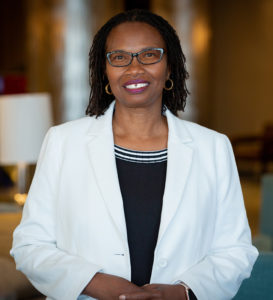
Pat Smith is the president and CEO of The Funders Network, a membership organization comprised of more than 170 local, regional and national foundations across the U.S. and Canada committed to creating more sustainable, prosperous and equitable communities.

